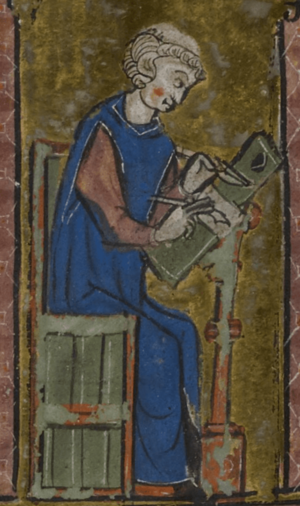Adam de la Halle facts for kids
Adam de la Halle (born between 1245 and 1250 – died between 1285 and 1288, or after 1306) was a French poet and composer. He was known as a trouvère, which was a type of medieval poet-musician. Adam was special because he wrote both simple, single-line music (called monophony) and more complex music with many parts (called polyphony). He is seen as one of the most important music and literature figures of the 1200s in Europe.
Adam's works include many types of songs called chansons. He also wrote jeux-partis, which were like musical debates. He created polyphonic rondels and motets, which were early forms of church music. His most famous work is a musical play called Jeu de Robin et Marion (around 1282–83). This play is thought to be the oldest surviving French play with music that was not about religion. Adam was also part of a group of performers and citizens in Arras called the Confrérie des jongleurs et bourgeois d'Arras.
Contents
Life and Career
Adam de la Halle was born in Arras, France. He was sometimes called "le Bossu d'Arras" (the Hunchback of Arras), but he said he was not actually a hunchback. This was likely a family nickname. His father, Henri de la Halle, was a well-known citizen of Arras.
Adam studied grammar, theology, and music at the Cistercian abbey of Vaucelles, near Cambrai. He was supposed to become a churchman, but he changed his mind. He then married a woman named Marie. Marie is mentioned in many of his songs, rondeaux, and jeux-partis.
Later, Adam joined the household of Robert II, Count of Artois. After that, he worked for Charles of Anjou, who was the brother of King Louis IX. Adam traveled with Charles to places like Egypt, Syria, Palestine, and Italy. When Charles became king of Naples, Adam wrote his most famous work, Jeu de Robin et Marion, at his court.
Works
Adam de la Halle created many different types of works. He wrote thirty-six chansons (songs), forty-six rondets de carole, eighteen jeux-partis (poetic debates), and fourteen rondeaux. He also composed five motets, a rondeau-virelai, a ballette, a dit d'amour, and a congé.
Many of Adam's shorter pieces have music that goes with them. His play, Jeu de Robin et Marion, is known as the first French play with music that was not religious. This play is a pastoral story about a girl named Marion who stays loyal to her shepherd boyfriend, Robert, even when a knight tries to win her over. The play uses popular songs of the time. The music in this play sounds like folk music and is often seen as more natural than his more complex songs and motets. Some people think Le Jeu de Robin et Marion and another play, Le Jeu de la feuillée, were early versions of comic opera.
His other play, Le jeu Adan or Le jeu de la Feuillee (around 1262), is a funny play where he makes fun of himself, his father, and other people from Arras. He also wrote a congé, which was a satirical farewell to his city, Arras. He started an unfinished long poem called a chanson de geste in honor of Charles of Anjou, called Le roi de Secile, in 1282. Another short piece, Le jeu du pelerin, is sometimes thought to be his work too.
Recordings
- 1955 – Adam de La Halle. Le jeu de Robin et de Marion; 13 rondeaux. Performed by Pro Musica Antiqua, Brussels, led by Safford Cape.
- 1991 – Adam de La Halle. Le jeu de Robin et Marion. Performed by Ensemble Perceval, led by Guy Robert.
- 1991 – Adam de La Halle. Le jeu de Robin et Marion. Performed by Schola Cantorum Basiliensis, led by Thomas Binkley.
- 1998 – "Robin Loves Me" arranged for solo guitar and performed by Gareth Koch on his "Carmina Burana" CD.
- 2004 – Zodiac. Ars Nova and Ars Subtilior in the Low Countries and Europe. Performed by Capilla Flamenca.
- 2006 – Adam de La Halle. D'amoureus cuer voel chanter, Anne Delafosse-Quentin, Les Jardins de Courtoisie.
- 2019 – Noel Akchoté. Adam de La Halle - Le Doux Regard de ma Dame.
See also
 In Spanish: Adam de la Halle para niños
In Spanish: Adam de la Halle para niños
 | William M. Jackson |
 | Juan E. Gilbert |
 | Neil deGrasse Tyson |


